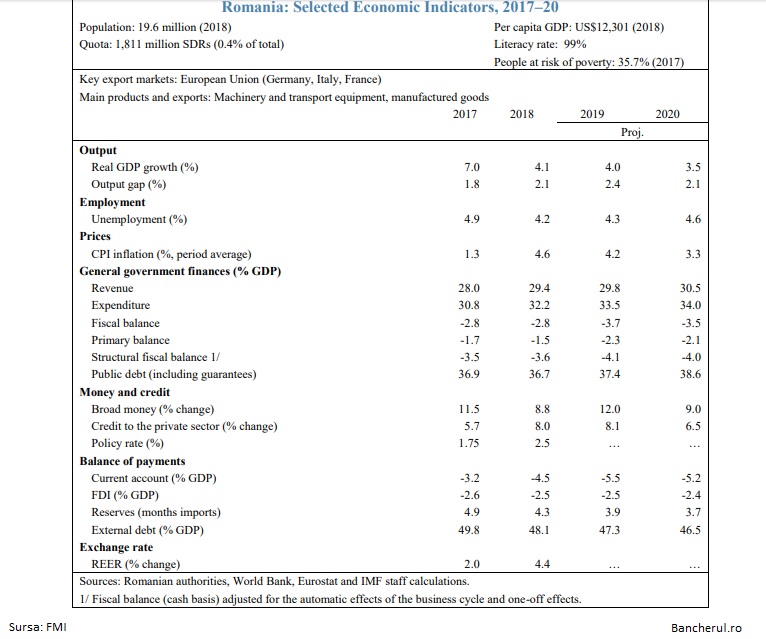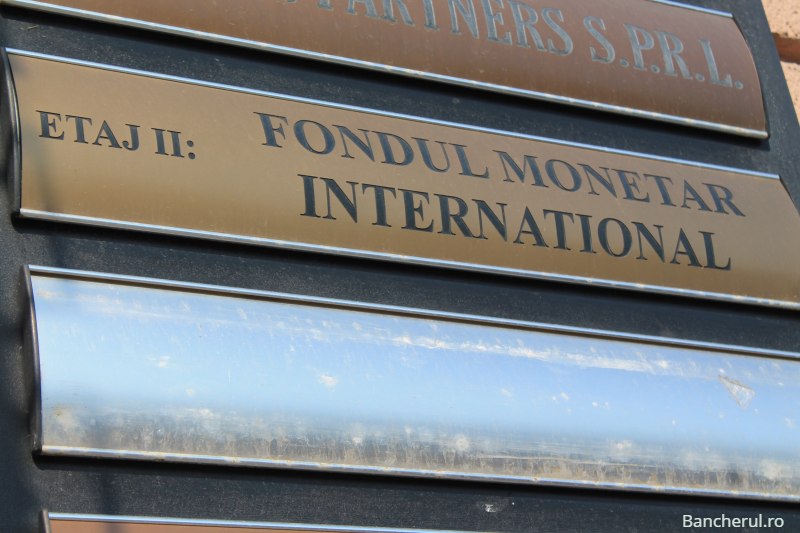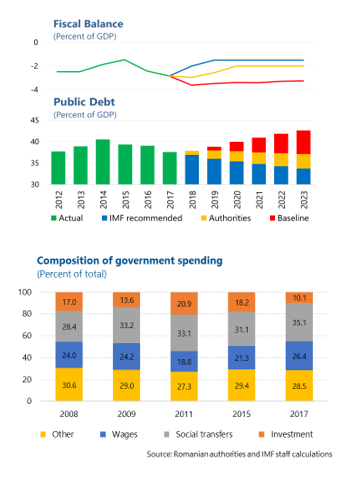IMF concludes article IV consultation with Romania

IMF Executive Board Concludes Article IV Consultation with Romania and Ex-Post Evaluation of Exceptional Access Under the 2013 Stand-By Arrangement
May 25, 2017
On May 22, 2017 the Executive Board of the International Monetary Fund (IMF) concluded the Article IV consultation [1] with Romania.
Romania saw strong economic growth in 2016, resulting in a closed output gap. Private consumption was boosted by an expansionary and pro-cyclical fiscal policy and wage increases. The cyclically adjusted budget deficit grew by 1½ percent of GDP in 2016, reflecting large tax rate cuts and wage increases. Headline inflation remained subdued due to indirect tax cuts, administrative price adjustments, and low euro area inflation and oil prices. There has been welcome progress in reducing banking sector non-performing loans.
Growth is expected to reach 4.2 percent in 2017—supported by continued stimulus to private consumption from a new round of fiscal relaxation and wage increases—and to moderate to 3½ percent in the medium term. A reorientation of policies—from stimulating consumption to supporting investment—is required to reduce poverty, raise medium term growth, and accelerate the pace of convergence towards the EU’s income level.
The main risks to the economic outlook include a perception of weakening fiscal prudence or institutions, which could adversely affect market confidence. This, together with heightened political tensions, could erode consumption and investment, increase the cost of government borrowing and put pressure on the exchange rate which would affect banks’ balance sheets through their FX exposures. Maintaining adequate reserve levels, a flexible exchange rate, and fiscal buffers will help against such risks. Prudent economic policies and visible steps to accelerate the pace of structural reforms and improve governance would send a powerful signal about Romania as a good place for doing business.
The Executive Board also discussed an ex post evaluation of the precautionary SBA with Romania approved in September 2013. The ex post evaluation finds that while policy objectives under the program were broadly appropriate, and some progress was achieved, setbacks on key structural reforms and concerns about the quality of fiscal measures prevented program completion. The report also includes recommendations for the design of future Fund programs.
Executive Board Assessment
Executive Directors welcomed Romania’s progress in reducing economic imbalances after the global financial crisis. Growth has been robust in recent years and unemployment has declined. Directors noted, however, that the recent deterioration in fiscal policies and a weakened pace of structural reforms could threaten these gains. Against this background, they underscored the need for a reorientation of policies from stimulating consumption towards supporting investment to protect buffers and sustainably raise living standards.
While observing that Romania’s public debt is relatively low, Directors highlighted that the recent and projected fiscal expansion is not warranted by the economy’s cyclical position. Successive tax cuts have reduced revenues while the share of wages and pensions has grown at the cost of investment. Directors underscored that additional measures would be needed to keep the fiscal deficit below the authorities’ target of 3 percent of GDP in 2017.
Directors noted that the unified wage bill and further tax cuts pose risks to the fiscal balance. They called for targeting a medium-term deficit of 1.5 percent of GDP to protect buffers and gradually reduce public debt. Directors emphasized the need to avoid further tax cuts, moderate pension increases, and carefully assess and modify the planned unified wage law in line with available fiscal space and the medium-term fiscal objectives. They encouraged efforts to enhance the effectiveness of the public sector. These include strengthening revenue administration, enhancing expenditure efficiency, and strengthening transparency and commitment controls for local investment programs.
Directors noted that there has been some progress with structural reforms. They emphasized the need to reenergize the reform momentum to secure faster convergence with the EU. Priority should be given to improving the performance of state-owned enterprises, including by restarting the privatization and restructuring program, and fully implementing the corporate governance law. Directors also called for stronger efforts to strengthen public investment management institutions to fully utilize EU funds and improve the quality of domestically-financed public investment. Recognizing progress made in the fight against corruption, Directors encouraged the authorities to maintain the momentum.
Directors encouraged the central bank to remain vigilant to rising inflationary pressures and to consider tightening monetary conditions. They recommended supporting higher market rates by narrowing the interest rate corridor and absorbing excess liquidity. This would lay the groundwork for a subsequent policy rate hike.
Directors commended the significant reduction in nonperforming loans and underscored the need for continued efforts to reduce them further, especially for corporate loans. They welcomed the decisions of the Constitutional Court which have lessened threats to financial stability. Directors called for close monitoring of the growing exposure of banks to households and government debt and taking steps to mitigate emerging risks.
Directors broadly agreed with the conclusions of the ex post evaluation of the precautionary SBA approved in September 2013. They noted that while policy objectives under the program were broadly appropriate and some progress was achieved, setbacks on key structural reforms and concerns about the quality of fiscal measures prevented program completion. Directors considered that the EPE on Romania held some potentially useful lessons for the design of future Fund programs, including the need to pay close attention to political economy and capacity constraints, prioritization and sequencing of reforms, and private sector balance sheets and their role in the financing of the economy.
Source: IMF statement
Comentarii
Nu există comentarii pentru această știre.
Adauga un comentariu
Alte stiri din categoria: Noutati FMI
FMI: criza COVID-19 se transforma in criza economica si financiara in 2020, suntem pregatiti cu 1 trilion (o mie de miliarde) de dolari, pentru a ajuta tarile in dificultate; prioritatea sunt ajutoarele financiare pentru familiile si firmele vulnerabile
Fondul Monetar International (FMI), institutia care acorda imprumuturi de ultima instanta tarilor ajunse in pragul falimentului, avertizeaza ca pandemia virusului COVID-19 se va transforma in 2020 intr-o criza economica si... detalii
FMI cere BNR sa intareasca politica monetara iar Guvernului sa modifice legea pensiilor
Fondul Monetar International (FMI) cere Bancii Nationale a Romaniei (BNR) sa intareasca politica monetara, pentru a struni inflatia in crestere, iar Guvernului sa modifice legea pensiilor, care ar putea submina... detalii
FMI: majorarea salariilor din sectorul public si legea pensiilor ar trebui reevaluate
FMI își încheie vizita în România (comunicat de presa):Comunicatele de presă de final de misiune cuprind declarații ale echipei FMI prin care se transmit constatările preliminare după vizita într-o țară.... detalii
IMF statement of the 2018 Article IV Mission to Romania
The Romanian economy is growing strongly, unemployment has fallen to a record low, and the financial sector is improving. But without policy changes, growth will turn increasingly fragile, according to... detalii
 Jaewoo Lee, new IMF mission chief for Romania and Bulgaria
Jaewoo Lee, new IMF mission chief for Romania and Bulgaria
 IMF concludes article IV consultation with Romania
IMF concludes article IV consultation with Romania
 IMF statement on the stability of the banking system in Ukraine
IMF statement on the stability of the banking system in Ukraine
 Global House Prices: Time to Worry Again?
Global House Prices: Time to Worry Again?
 FMI: Raport de asistenta tehnica - Imbunatatirea administrarii riscului de conformare pe care il prezinta marii contribuabili
FMI: Raport de asistenta tehnica - Imbunatatirea administrarii riscului de conformare pe care il prezinta marii contribuabili
 IMF Director Christine Lagarde Calls for Broad-based Policy Effort to Reinvigorate Growth
IMF Director Christine Lagarde Calls for Broad-based Policy Effort to Reinvigorate Growth
 Speech by Janet Yellen on current conditions and the outlook for the U.S. economy
Speech by Janet Yellen on current conditions and the outlook for the U.S. economy
 IMF Executive Board Concludes 2016 Article IV Consultation with Romania
Vezi toate stirile
IMF Executive Board Concludes 2016 Article IV Consultation with Romania
Vezi toate stirile
Criza COVID-19
- In majoritatea unitatilor BRD se poate intra fara certificat verde
- La BCR se poate intra fara certificat verde
- Firmele, obligate sa dea zile libere parintilor care stau cu copiii in timpul pandemiei de coronavirus
- CEC Bank: accesul in banca se face fara certificat verde
- Cum se amana ratele la creditele Garanti BBVA
Topuri Banci
- Topul bancilor dupa active si cota de piata in perioada 2022-2015
- Topul bancilor cu cele mai mici dobanzi la creditele de nevoi personale
- Topul bancilor la active in 2019
- Topul celor mai mari banci din Romania dupa valoarea activelor in 2018
- Topul bancilor dupa active in 2017
Asociatia Romana a Bancilor (ARB)
- Băncile din România nu au majorat comisioanele aferente operațiunilor în numerar
- Concurs de educatie financiara pentru elevi, cu premii in bani
- Creditele acordate de banci au crescut cu 14% in 2022
- Romanii stiu educatie financiara de nota 7
- Gradul de incluziune financiara in Romania a ajuns la aproape 70%
ROBOR
- ROBOR: ce este, cum se calculeaza, ce il influenteaza, explicat de Asociatia Pietelor Financiare
- ROBOR a scazut la 1,59%, dupa ce BNR a redus dobanda la 1,25%
- Dobanzile variabile la creditele noi in lei nu scad, pentru ca IRCC ramane aproape neschimbat, la 2,4%, desi ROBOR s-a micsorat cu un punct, la 2,2%
- IRCC, indicele de dobanda pentru creditele in lei ale persoanelor fizice, a scazut la 1,75%, dar nu va avea efecte imediate pe piata creditarii
- Istoricul ROBOR la 3 luni, in perioada 01.08.1995 - 31.12.2019
Taxa bancara
- Normele metodologice pentru aplicarea taxei bancare, publicate de Ministerul Finantelor
- Noul ROBOR se va aplica automat la creditele noi si prin refinantare la cele in derulare
- Taxa bancara ar putea fi redusa de la 1,2% la 0,4% la bancile mari si 0,2% la cele mici, insa bancherii avertizeaza ca indiferent de nivelul acesteia, intermedierea financiara va scadea iar dobanzile vor creste
- Raiffeisen anunta ca activitatea bancii a incetinit substantial din cauza taxei bancare; strategia va fi reevaluata, nu vor mai fi acordate credite cu dobanzi mici
- Tariceanu anunta un acord de principiu privind taxa bancara: ROBOR-ul ar putea fi inlocuit cu marja de dobanda a bancilor
Statistici BNR
- Deficitul contului curent, creștere cu 16% în ianuarie 2025
- Deficitul contului curent, aproape 30 miliarde euro în 2024
- Deficitul contului curent, aproape 20 miliarde euro după primele nouă luni
- Deficitul contului curent, aproape 18 miliarde euro după primele opt luni
- Deficitul contului curent, peste 9 miliarde euro pe primele cinci luni
Legislatie
- Decizia nr.105/2007 privind raportarea la Biroul de Credit
- Legea nr. 311/2015 privind schemele de garantare a depozitelor şi Fondul de garantare a depozitelor bancare
- Rambursarea anticipata a unui credit, conform OUG 50/2010
- OUG nr.21 din 1992 privind protectia consumatorului, actualizata
- Legea nr. 190 din 1999 privind creditul ipotecar pentru investiții imobiliare
Lege plafonare dobanzi credite
- Care este dobanda maxima la un credit IFN?
- BNR propune Parlamentului plafonarea dobanzilor la creditele bancilor intre 1,5 si 4 ori peste DAE medie, in functie de tipul creditului; in cazul IFN-urilor, plafonarea dobanzilor nu se justifica
- Legile privind plafonarea dobanzilor la credite si a datoriilor preluate de firmele de recuperare se discuta in Parlament (actualizat)
- Legea privind plafonarea dobanzilor la credite nu a fost inclusa pe ordinea de zi a comisiilor din Camera Deputatilor
- Senatorul Zamfir, despre plafonarea dobanzilor la credite: numai bou-i consecvent!
Anunturi banci
- BCR este inchisa vineri, 18 aprilie, si luni, 21 aprilie
- Cererile de transfer de bani prin Whatsapp, Telegram, Messenger sunt fraude
- Un telefon sau mesaj care pare de la banca poate fi frauda
- Cererea unui ajutor in bani poate fi o inselaciune
- Cate reclamatii primeste Intesa Sanpaolo Bank si cum le gestioneaza
Analize economice
- Inflația anuală, redusă la 4,86%
- Comerțul, a cincea lună consecutivă de ajustare a creșterii
- Pensia reală a crescut cu peste 15% anul trecut
- Deficitul bugetar, rezultat slab după primele două luni
- Deficit comercial în creștere cu 38,5% pe ianuarie 2025
Ministerul Finantelor
- Deficitul bugetar, din ce în ce mai mare la început de an
- -8,65% din PIB, deficit bugetar pe anul 2024
- Datoria publică, 51,4% din PIB la mijlocul anului
- Deficit bugetar de 3,6% din PIB după prima jumătate a anului
- Deficit bugetar de 3,4% din PIB după primele cinci luni ale anului
Biroul de Credit
- FUNDAMENTAREA LEGALITATII PRELUCRARII DATELOR PERSONALE IN SISTEMUL BIROULUI DE CREDIT
- BCR: prelucrarea datelor personale la Biroul de Credit
- Care banci si IFN-uri raporteaza clientii la Biroul de Credit
- Ce trebuie sa stim despre Biroul de Credit
- Care este procedura BCR de raportare a clientilor la Biroul de Credit
Procese
- ANPC pierde un proces cu Intesa si ARB privind modul de calcul al ratelor la credite
- Un client Credius obtine in justitie anularea creditului, din cauza dobanzii prea mari
- Hotararea judecatoriei prin care Aedificium, fosta Raiffeisen Banca pentru Locuinte, si statul sunt obligati sa achite unui client prima de stat
- Decizia Curtii de Apel Bucuresti in procesul dintre Raiffeisen Banca pentru Locuinte si Curtea de Conturi
- Vodafone, obligata de judecatori sa despagubeasca un abonat caruia a refuzat sa-i repare un telefon stricat sau sa-i dea banii inapoi (decizia instantei)
Stiri economice
- Deficitul comercial pe primele două luni ale anului, majorat cu 35%
- România, campioana europeană la șomajul tinerilor
- România, pe locul trei în UE la creșterea costului salarial în T4 2024
- Producția industrială, scădere conjuncturală în ianuarie 2025
- Datoria publică, 54,6% din PIB la finele lui 2024
Statistici
- România, marginal peste Estonia la inflația anuală
- România, a doua țară din UE ca pondere a salariaților cu venituri mici
- România, pe locul trei în UE la creșterea costului muncii în T2 2024
- Cheltuielile cu pensiile - România, pe locul 19 în UE ca pondere în PIB
- Dobanda din Cehia a crescut cu 7 puncte intr-un singur an
FNGCIMM
- Programul IMM Invest continua si in 2021
- Garantiile de stat pentru credite acordate de FNGCIMM au crescut cu 185% in 2020
- Programul IMM invest se prelungeste pana in 30 iunie 2021
- Firmele pot obtine credite bancare garantate si subventionate de stat, pe baza facturilor (factoring), prin programul IMM Factor
- Programul IMM Leasing va fi operational in perioada urmatoare, anunta FNGCIMM
Calculator de credite
- ROBOR la 3 luni a scazut cu aproape un punct, dupa masurile luate de BNR; cu cat se reduce rata la credite?
- In ce mall din sectorul 4 pot face o simulare pentru o refinantare?
Noutati BCE
- Dobanda la euro scade la 2,25%
- Acord intre BCE si BNR pentru supravegherea bancilor
- Banca Centrala Europeana (BCE) explica de ce a majorat dobanda la 2%
- BCE creste dobanda la 2%, dupa ce inflatia a ajuns la 10%
- Dobânda pe termen lung a continuat să scadă in septembrie 2022. Ecartul față de Polonia și Cehia, redus semnificativ
Noutati EBA
- Bancile romanesti detin cele mai multe titluri de stat din Europa
- Guidelines on legislative and non-legislative moratoria on loan repayments applied in the light of the COVID-19 crisis
- The EBA reactivates its Guidelines on legislative and non-legislative moratoria
- EBA publishes 2018 EU-wide stress test results
- EBA launches 2018 EU-wide transparency exercise
Noutati FGDB
- Banii din banci sunt garantati, anunta FGDB
- Depozitele bancare garantate de FGDB au crescut cu 13 miliarde lei
- Depozitele bancare garantate de FGDB reprezinta doua treimi din totalul depozitelor din bancile romanesti
- Peste 80% din depozitele bancare sunt garantate
- Depozitele bancare nu intra in campania electorala
CSALB
- Sistemul bancar romanesc este deosebit de bine pregatit pentru orice fel de socuri
- La CSALB poti castiga un litigiu cu banca pe care l-ai pierde in instanta
- Negocierile dintre banci si clienti la CSALB, in crestere cu 30%
- Sondaj: dobanda fixa la credite, considerata mai buna decat cea variabila, desi este mai mare
- CSALB: Romanii cu credite caută soluții pentru reducerea ratelor. Cum raspund bancile
First Bank
- Ce trebuie sa faca cei care au asigurare la credit emisa de Euroins
- First Bank este reprezentanta Eurobank in Romania: ce se intampla cu creditele Bancpost?
- Clientii First Bank pot face plati prin Google Pay
- First Bank anunta rezultatele financiare din prima jumatate a anului 2021
- First Bank are o noua aplicatie de mobile banking
Noutati FMI
- FMI: criza COVID-19 se transforma in criza economica si financiara in 2020, suntem pregatiti cu 1 trilion (o mie de miliarde) de dolari, pentru a ajuta tarile in dificultate; prioritatea sunt ajutoarele financiare pentru familiile si firmele vulnerabile
- FMI cere BNR sa intareasca politica monetara iar Guvernului sa modifice legea pensiilor
- FMI: majorarea salariilor din sectorul public si legea pensiilor ar trebui reevaluate
- IMF statement of the 2018 Article IV Mission to Romania
- Jaewoo Lee, new IMF mission chief for Romania and Bulgaria
Noutati BERD
- Creditele neperformante (npl) - statistici BERD
- BERD este ingrijorata de investigatia autoritatilor din Republica Moldova la Victoria Bank, subsidiara Bancii Transilvania
- BERD dezvaluie cat a platit pe actiunile Piraeus Bank
- ING Bank si BERD finanteaza parcul logistic CTPark Bucharest
- EBRD hails Moldova banking breakthrough
Noutati Federal Reserve
- Federal Reserve anunta noi masuri extinse pentru combaterea crizei COVID-19, care produce pagube "imense" in Statele Unite si in lume
- Federal Reserve urca dobanda la 2,25%
- Federal Reserve decided to maintain the target range for the federal funds rate at 1-1/2 to 1-3/4 percent
- Federal Reserve majoreaza dobanda de referinta pentru dolar la 1,5% - 1,75%
- Federal Reserve issues FOMC statement
Noutati BEI
- BEI a redus cu 31% sprijinul acordat Romaniei in 2018
- Romania implements SME Initiative: EUR 580 m for Romanian businesses
- European Investment Bank (EIB) is lending EUR 20 million to Agricover Credit IFN
Mobile banking
- Comisioanele BRD pentru MyBRD Mobile, MyBRD Net, My BRD SMS
- Termeni si conditii contractuale ale serviciului You BRD
- Recomandari de securitate ale BRD pentru utilizatorii de internet/mobile banking
- CEC Bank - Ghid utilizare token sub forma de card bancar
- Cinci banci permit platile cu telefonul mobil prin Google Pay
Noutati Comisia Europeana
- Avertismentul Comitetului European pentru risc sistemic (CERS) privind vulnerabilitățile din sistemul financiar al Uniunii
- Cele mai mici preturi din Europa sunt in Romania
- State aid: Commission refers Romania to Court for failure to recover illegal aid worth up to €92 million
- Comisia Europeana publica raportul privind progresele inregistrate de Romania in cadrul mecanismului de cooperare si de verificare (MCV)
- Infringements: Commission refers Greece, Ireland and Romania to the Court of Justice for not implementing anti-money laundering rules
Noutati BVB
- BET AeRO, primul indice pentru piata AeRO, la BVB
- Laptaria cu Caimac s-a listat pe piata AeRO a BVB
- Banca Transilvania plateste un dividend brut pe actiune de 0,17 lei din profitul pe 2018
- Obligatiunile Bancii Transilvania se tranzactioneaza la Bursa de Valori Bucuresti
- Obligatiunile Good Pople SA (FRU21) au debutat pe piata AeRO
Institutul National de Statistica
- România, la 78% din PIB-ul mediu pe locuitor al UE
- Producția industrială, la cota -1,8% după 11 luni din 2024
- Deficitul contului curent, peste 26 miliarde euro în noiembrie 2024
- Comerțul cu amănuntul - în creștere cu 8% pe primele 10 luni
- Deficitul balanței comerciale la 9 luni, cu 15% mai mare față de aceeași perioadă a anului trecut
Informatii utile asigurari
- Data de la care FGA face plati pentru asigurarile RCA Euroins: 17 mai 2023
- Asigurarea împotriva dezastrelor, valabilă și in caz de faliment
- Asiguratii nu au nevoie de documente de confirmare a cutremurului
- Cum functioneaza o asigurare de viata Metropolitan pentru un credit la Banca Transilvania?
- Care sunt documente necesare pentru dosarul de dauna la Cardif?
ING Bank
- La ING se vor putea face plati instant din decembrie 2022
- Cum evitam tentativele de frauda online?
- Clientii ING Bank trebuie sa-si actualizeze aplicatia Home Bank pana in 20 martie
- Obligatiunile Rockcastle, cel mai mare proprietar de centre comerciale din Europa Centrala si de Est, intermediata de ING Bank
- ING Bank transforma departamentul de responsabilitate sociala intr-unul de sustenabilitate











